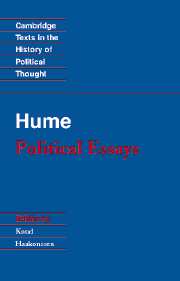Book contents
- Frontmatter
- Contents
- Acknowledgements
- Introduction
- Chronology
- Bibliographical notes
- A note on the text and the edition
- Biographical notes
- Bibliography
- Political Essays
- 1 Of the liberty of the press
- 2 That politics may be reduced to a science
- 3 Of the first principles of government
- 4 Of the origin of government
- 5 Of the independency of Parliament
- 6 Whether the British government inclines more to absolute monarchy, or to a republic
- 7 Of parties in general
- 8 Of the parties of Great Britain
- 9 Of superstition and enthusiasm
- 10 Of civil liberty
- 11 Of the rise and progress of the arts and sciences
- 12 Of national characters
- 13 Of commerce
- 14 Of refinement in the arts
- 15 Of money
- 16 Of interest
- 17 Of the balance of trade
- 18 Of the jealousy of trade
- 19 Of the balance of power
- 20 Of taxes
- 21 Of public credit
- 22 Of some remarkable customs
- 23 Of the original contract
- 24 Of passive obedience
- 25 Of the coalition of parties
- 26 Of the Protestant succession
- 27 Idea of a perfect commonwealth
- Appendix: Excerpts from Hume's History of England
- Notes
- Index
- Title in the Series
9 - Of superstition and enthusiasm
Published online by Cambridge University Press: 05 June 2012
- Frontmatter
- Contents
- Acknowledgements
- Introduction
- Chronology
- Bibliographical notes
- A note on the text and the edition
- Biographical notes
- Bibliography
- Political Essays
- 1 Of the liberty of the press
- 2 That politics may be reduced to a science
- 3 Of the first principles of government
- 4 Of the origin of government
- 5 Of the independency of Parliament
- 6 Whether the British government inclines more to absolute monarchy, or to a republic
- 7 Of parties in general
- 8 Of the parties of Great Britain
- 9 Of superstition and enthusiasm
- 10 Of civil liberty
- 11 Of the rise and progress of the arts and sciences
- 12 Of national characters
- 13 Of commerce
- 14 Of refinement in the arts
- 15 Of money
- 16 Of interest
- 17 Of the balance of trade
- 18 Of the jealousy of trade
- 19 Of the balance of power
- 20 Of taxes
- 21 Of public credit
- 22 Of some remarkable customs
- 23 Of the original contract
- 24 Of passive obedience
- 25 Of the coalition of parties
- 26 Of the Protestant succession
- 27 Idea of a perfect commonwealth
- Appendix: Excerpts from Hume's History of England
- Notes
- Index
- Title in the Series
Summary
Thatthe corruption of the best things produces the worst, is grown into a maxim, and is commonly proved, among other instances, by the pernicious effects of superstition and enthusiasm, the corruptions of true religion.
These two species of false religion, though both pernicious, are yet of a very different, and even of a contrary nature. The mind of man is subject to certain unaccountable terrors and apprehensions, proceeding either from the unhappy situation of private or public affairs, from ill health, from a gloomy and melancholy disposition, or from the concurrence of all these circumstances. In such a state of mind, infinite unknown evils are dreaded from unknown agents; and where real objects of terror are wanting, the soul, active to its own prejudice, and fostering its predominant inclination, finds imaginary ones, to whose power and malevolence it sets no limits. As these enemies are entirely invisible and unknown, the methods taken to appease them are equally unaccountable, and consist in ceremonies, observances, mortifications, sacrifices, presents, or in any practice, however absurd or frivolous, which either folly or knavery recommends to a blind and terrified credulity. Weakness, fear, melancholy, together with ignorance, are, therefore, the true sources of superstition.
But the mind of man is also subject to an unaccountable elevation and presumption, arising from prosperous success, from luxuriant health, from strong spirits, or from a bold and confident disposition.
- Type
- Chapter
- Information
- Hume: Political Essays , pp. 46 - 50Publisher: Cambridge University PressPrint publication year: 1994
- 2
- Cited by



